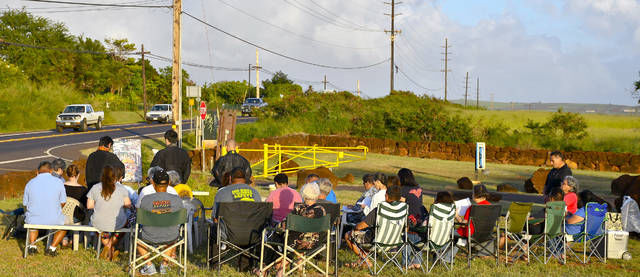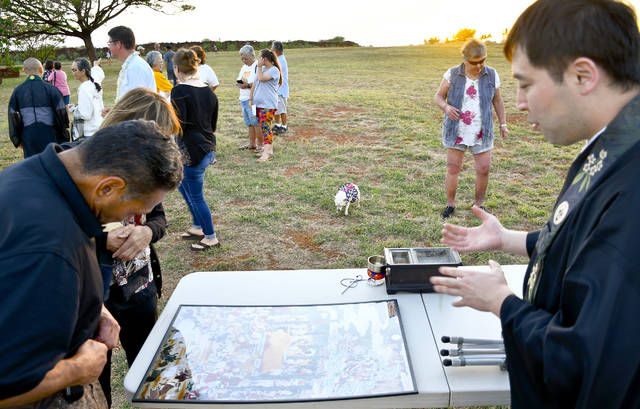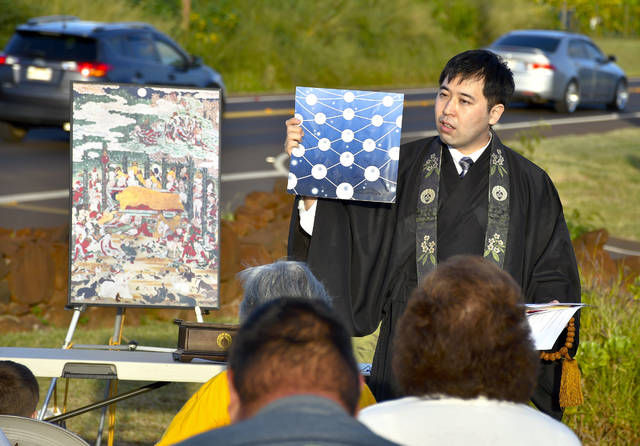WAIMEA — All lives are precious, Scott Pisani, executive director of the Kauai Humane Society, said Saturday as the sun dipped below the shoreline at the Russian Fort. “I have seen the depth of joy animals give humans,” Pisani said.
WAIMEA — All lives are precious, Scott Pisani, executive director of the Kauai Humane Society, said Saturday as the sun dipped below the shoreline at the Russian Fort.
“I have seen the depth of joy animals give humans,” Pisani said. “Some of the animals who perish on the side of the road by speeding motorists are pets. Others are there because it is a part of their life. Their loss might be silently mourned by monitors who care for the roadside. There are many lives that pass silently. Only yesterday, we lost two lives and there are many who are troubled. We need to remember all, and recognize that life has value. When we think of those animals who perish along the roads, we need to remind ourselves of the value of all life, and also that of our own life.”
Pisani addressed a small crowd of about three dozen bathed in the waning daylight. His words were accompanied by the drone of a mower and the sound of passing cars, some honking as they passed.
“When I moved to Kauai from Japan, I was so shocked to see so many dead birds on the highway,” said the Rev. Noriaki Fujimori of the Waimea Higashi Hongwanji. “They were run over by our cars. I thought this over and questioned how, and why they could be run over by our cars. The answer I discovered is that the birds are no match to man-made speed — a thing that can take flight was killed by a faster-moving machine driven by a human. The birds probably think they are OK to stay on the highway, maybe even enjoy playing there. Then, a speedy vehicle hits them — maybe they die right away, or they suffer until they die. Either way, this loss of life is so sad. The birds have no idea because this man-made speed is new to their world and they had no way to prepare for it.”
The Rev. Tomo Hojo of the West Kauai Hongwanji Mission said the sight of numerous animal corpses on the roadsides prompted himself, Fujimori and the Rev. Kohtoku Hirao of the Waimea Shingon Mission to host the first-ever animals memorial service.
“Through Buddha’s eyes, all life shines like gold and connects with each other,” Hojo said. “This is what we call ‘interdependence.’ We are a product of many influences that create who we are, and how we feel. As waves are part of the ocean, we are a part of the rest of the universe. Today, the principle of interdependence offers a rallying point for the environmental movement, and modern scientists are showing how the system of nature is all linked together. Each system in nature needs all the others to stay alive. We are all connected with others; without the connection, we cannot survive.”
Hirao, speaking before a painting of Nirvana, spoke of the equality of life.
“This painting depicts the time when Shakyamuni Buddha died,” Hirao said. “Many pupils of Buddha, and other Buddhas came and are crying around the dead Shakyamuni Buddha. What I would like to pay attention to is that there are animals with them — various animals, including elephants, cranes, turtles, tigers, horses, pigs, dogs, deer, frogs and insects like dragonflies, snails, mantises, grasshoppers and butterflies. They are mourning the death of Buddha like humans. This expresses that all living things are equal under Buddhism. We think everything has its life, its soul. There is no rank in the importance of life.”
Fujimori said dead animals can be a reminder to those driving past.
“We continue to encounter the dead bodies of animals on the highway,” he said. “These are not just limited to birds. I cannot judge this simply as bad, but we ought to be mindful in how we live together with nature — birds, wild animals, the soil, the trees, and so forth. Dead animals are just one very tangible reminder of how swiftly and directly we can impact our environment. Let us consider all living things.”




